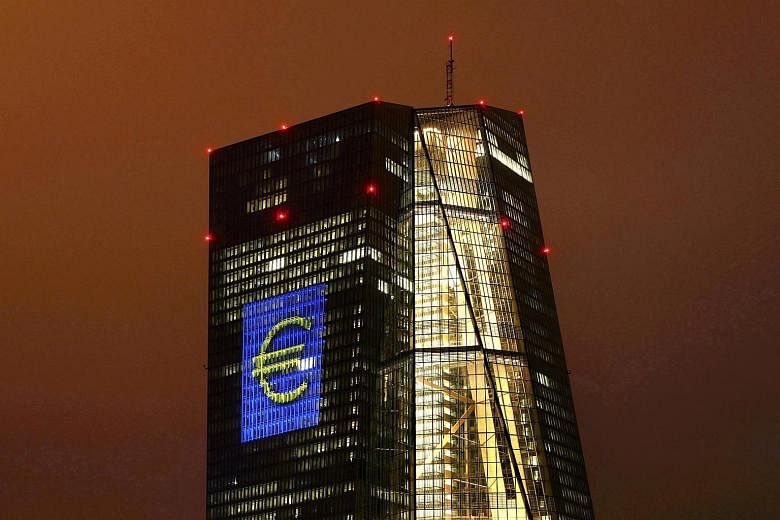FRANKFURT (REUTERS) - European Central Bank policymakers are open to a further step towards reducing their monetary stimulus but are likely to move slowly out of fear of causing market turmoil, minutes of their last meeting showed on Thursday.
With inflation in the euro zone slowly rebounding, the ECB is preparing to dial back its stimulus policy of ultra-low rates and massive bond purchases, but doing so without upsetting investors is proving a challenge after years of easy money.
Rate setters meeting on June 7-8 discussed dropping a long-standing pledge to boost the ECB's 2.3 trillion euros (S$3.6 trillion) bond purchase programme if necessary, a key element of their policy message.
Eventually they decided against doing so because the euro zone's economic recovery had yet to result in higher inflation - the bank's main policy objective.
But, confirming a Reuters exclusive, the central bankers said they could review that so-called easing bias at future meetings. "If confidence in the inflation outlook improved further, the case for retaining this bias could be reviewed," the ECB said in its policy accounts.
German government bond yields hit new 18-month highs and the euro edged higher after the minutes were released as traders speculated on a "tapering" of the ECB's debt-purchase programme, due to run until December.
They were resuming a rally started last week, when ECB President Mario Draghi hinted at possible policy tweaks. "The ECB's tiptoeing towards tapering will continue," said ING economist Carsten Brzeski. "It should remain a very gradual and cautious process, given the ECB's fear of taper tantrum."
In the minutes, the ECB stressed the need for "continued caution in communication" as any perception that it was moving away from its stimulus policy could roil financial markets, undoing some of its previous efforts.
Indeed, ECB Chief Economist Peter Praet said earlier on Thursday the central bank needed to be patient and maintain a steady hand in policy as inflation was still far below its target of almost 2 per cent.
Despite a brisk economic rebound, inflation in the euro zone was 1.3 per cent in June and is not expected to near 2 per cent at least until 2019.
ECB rate setters meeting in June said they found it"puzzling" that forecasts for core inflation had to be revised downwards despite stronger economic growth and a falling unemployment rate.
Still, Draghi argued last week that accelerating growth would in itself provide support so the ECB could tighten policy somewhat to keep the broad level of financial accommodation unchanged.
That message stirred markets, stoking speculation that policymakers could decide as early as September to reduce asset purchases from next year.
The ECB's asset buys are set to run until the end of the year and policymakers will decide in September or October whether to extend, reduce or gradually wind down the purchases.

